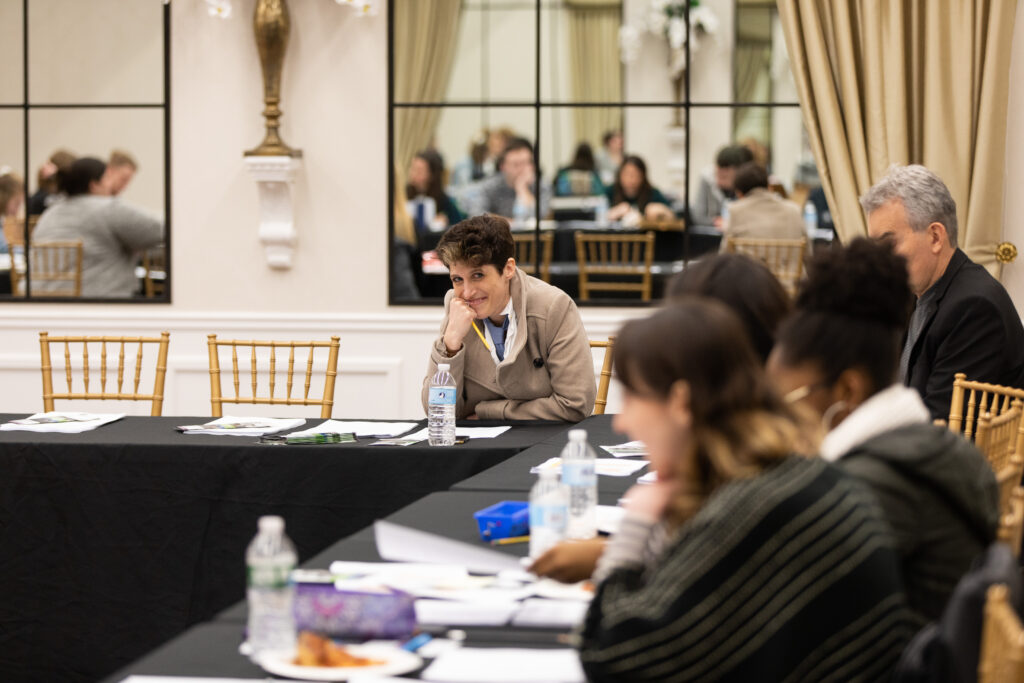Behind the Scenes with Livy Scanlon and Julius Caesar

Vice President of Communications for The Hanover Theatre and Conservatory Lisa Condit spoke with THT Rep’s artistic director, Olivia Scanlon, about William Shakespeare’s Julius Caesar coming to the Worcester Common this August. Read on for highlights from the interview, or listen to the full interview below. Then tune in to Talk of the Commonwealth with Hank Stolz on WCRN 830AM Fridays at 9 AM and Saturdays at 1 PM for more behind-the-scenes interviews.
Livy: I love Julius Caesar, it’s a great play. It’s among Shakespeare’s most accessible plays in terms of the language, and it’s also just really suspenseful and exciting. It’s categorized by Shakespeare scholars as a tragedy, but I really think of it as a drama. It’s like a suspenseful political drama sort of like House of Cards or whatever the next best political drama is. Then, in the second half of the play sort of turns into this kind of like epic civil war sort of Saving Private Ryan situation.
It’s not a dusty history piece, it’s really active and exciting. I just love it!
Lisa: A lot of people are wondering how it’s going to work at City Hall. Can you describe your concept?
Livy: Yeah, absolutely. I live in Worcester and I walk to work, or I ride my scooter to work at the BrickBox Theater in the Jean McDonough Arts Center, which means I cross the Worcester Common just about every day. It struck me more and more, especially as our country was sort of descending into turmoil, more and more turmoil I should say, that our Worcester Common is the absolute perfect space to stage Julius Caesar, and this is an absolutely perfect moment. Not that it’s ever not a relevant play, it’s just sort of hyper relevant. So, my vision is that the audience will primarily fit inside the oval, sort of on either side, leaving an aisle down the middle. Actors’ main playing space will be on the steps of City Hall, but they will also go down through the audience, through that central aisle and there will be some secondary action by the fountain. We really want to use that whole strip, so the audience is on either side of the action.
Livy’s Adaptation
Lisa: One of the things that really struck me when we did our staff reading is how interactive this can be. What a great moment for people to come together and really blend great literature with theatre and current events. Your vision for THT Rep and some of the new things you’re doing, especially with the auditions and casting for this really helps us circle back to some of the things that are important to our organization right now. Do you want to touch on that a little bit too?
Livy: Sure, I’ve adapted it to be about 18 characters and I will be changing some of the genders of the characters from male to female, or if we have nonbinary artists who join us, we’ll investigate how we navigate the pronouns in the text. Of course, we will endeavor to have a cast that is as diverse as America itself.
Even though I do intend on setting the play in ancient Rome with togas and all, there will be this kind of fun clash: the anachronistic costumes with this very contemporary, diverse cast of actors playing far fewer roles.
It will only be for about 90 minutes with an intermission, instead of five hours. It’s been a real fun challenge to re-envision the play with those thoughts in mind.
Worc at Play
Lisa: This is a really great opportunity, in collaboration with our Education Department and the conservatory for the new Worc at Play program.
Livy: Yeah, Worc at Play is something I’ve been envisioning, with the help of you, Lisa, and my other colleagues at The Hanover Theatre, to cultivate local, non-professional adult actors and give them some classical acting training and to cast them in the small roles in Julius Caesar.
This is going to be a no cost program; I’m seeking adults of all stripes who would like to learn what it takes to act Shakespeare professionally and then join our cast.
The way the Worc at Play program will work is we’ll hold some auditions, they won’t at all be like auditions for a professional actor, it’ll be a different feeling. I’d like to pick a group of five trainees, and we’ll meet once a week and I’ll teach them what they need to know to have the basics under their belt of acting Shakespeare. Then, I’ll cast them in five of the smaller roles and they’ll join us for the production. The goal here is really to cultivate five adults from the greater Worcester region who represent a real diverse cross section of age, gender, ethnicity, immigrant status, sexual orientation, gender orientation and lived experience. This is really open, if you don’t think of yourself as an “actor” that means you’re probably perfect for this program.
Made Possible by Generous Sponsors
Lisa: It is amazing that we are able to offer this as free and open to the public on the common Tuesday, August 3 all the way through Sunday August 22. We certainly would not be able to subsidize this performance without the generosity of the sponsors who have already stepped up. Our presenting sponsors are Assumption University and Bay State Savings Bank. Our supporting sponsor is Winn Development. Our contributing sponsors are Bartholomew and Company, Country Bank, Bowditch Attorneys and Fallon Health. There is room for more because this is a big project. Can you touch on that?
Livy: Yeah, sure, I’d love to talk about this. In this production of Julius Caesar, there is going to be a team of about 35 theatre professionals and that’s just the folks working directly on the show. That doesn’t include folks like you, Lisa, or Troy Siebels, or our entire Hanover Theatre staff who’s working to market and publicize the show, manage the box office, manage operations and so on and so forth. It’s an enormous undertaking and these are all professionals, with the exception of the Worc at Play folks who will be trainees.
Because of a confluence of forces, theatre professionals are paid a very, very, very humble wage. I’m proud that THT Rep is able to offer the wages we are, considering how young the initiative is, but, and we’re not alone in this, we’re not paying anywhere near what professionals of other disciplines earn. We’re going to try to close that gap a little bit and when you weigh that imperative against our desire to also make the show free and open to the public so that there’s no barrier to access in terms of ticket price, you’re suddenly getting squeezed on both sides.
You want to pay the people who are doing the work better, but you want to make the work itself accessible to the entire public. How do you do that? You rely on the generosity of individuals and corporations who are able to make those gifts.
If you are a person of means, or in a position of means within an organization or corporation, you can make such a huge impact by giving to this project. I hope people can hear the emotion in my voice because this is an issue that is really near and dear to me on both sides, paying the professionals well, and giving the public access to the work.




